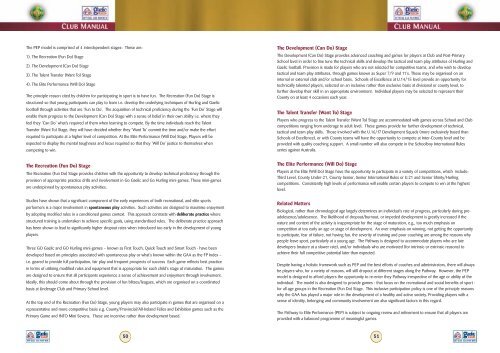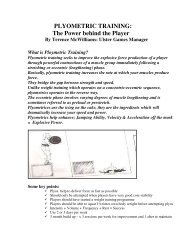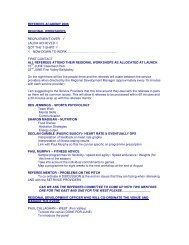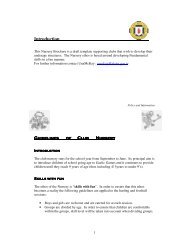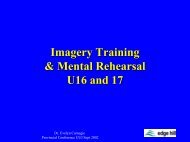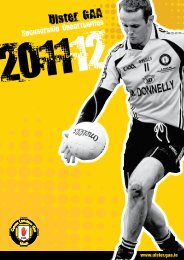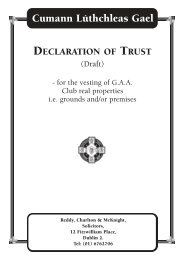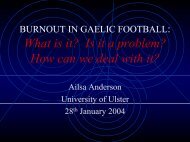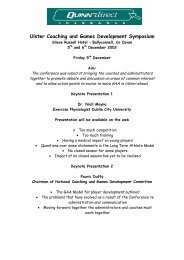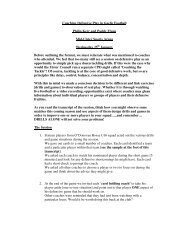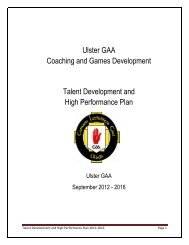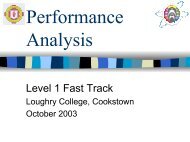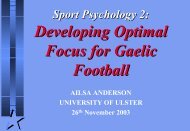Club Manual - Ulster GAA
Club Manual - Ulster GAA
Club Manual - Ulster GAA
Create successful ePaper yourself
Turn your PDF publications into a flip-book with our unique Google optimized e-Paper software.
The PEP model is comprised of 4 interdependent stages: These are:<br />
1). The Recreation (Fun Do) Stage<br />
2). The Development (Can Do) Stage<br />
3). The Talent Transfer (Want To) Stage<br />
4). The Elite Performance (Will Do) Stage<br />
The principle reason cited by children for participating in sport is to have fun. The Recreation (Fun Do) Stage is<br />
structured so that young participants can play to learn i.e. develop the underlying techniques of Hurling and Gaelic<br />
football through activities that are ‘Fun to Do’. The acquisition of technical proficiency during the ‘Fun Do’ Stage will<br />
enable them progress to the Development (Can Do) Stage with a sense of belief in their own ability i.e. where they<br />
feel they ‘Can Do’ what’s required of them when learning to compete. By the time individuals reach the Talent<br />
Transfer (Want To) Stage, they will have decided whether they ‘Want To’ commit the time and/or make the effort<br />
required to participate at a higher level of competition. At the Elite Performance (Will Do) Stage, Players will be<br />
expected to display the mental toughness and focus required so that they ‘Will Do’ justice to themselves when<br />
competing to win.<br />
The Recreation (Fun Do) Stage<br />
The Recreation (Fun Do) Stage provides children with the opportunity to develop technical proficiency through the<br />
provision of appropriate practice drills and involvement in Go Gaelic and Go Hurling mini-games. These mini-games<br />
are underpinned by spontaneous play activities.<br />
Studies have shown that a significant component of the early experiences of both recreational, and elite sports<br />
performers is a major involvement in spontaneous play activities. Such activities are designed to maximise enjoyment<br />
by adopting modified rules in a conditioned games context. This approach contrasts with deliberate practice where<br />
structured training is undertaken to achieve specific goals, using standardised rules. The deliberate practice approach<br />
has been shown to lead to significantly higher dropout rates when introduced too early in the development of young<br />
players.<br />
Three GO Gaelic and GO Hurling mini-games – known as First Touch, Quick Touch and Smart Touch - have been<br />
developed based on principles associated with spontaneous play or what’s known within the <strong>GAA</strong> as the FP Index –<br />
i.e. geared to provide full participation, fair play and frequent prospects of success Each game reflects best practice<br />
in terms of utilising modified rules and equipment that is appropriate for each child’s stage of maturation. The games<br />
are designed to ensure that all participants experience a sense of achievement and enjoyment through involvement.<br />
Ideally, this should come about through the provision of fun blitzes/leagues, which are organised on a coordinated<br />
basis at Underage <strong>Club</strong> and Primary School level.<br />
At the top end of the Recreation (Fun Do) Stage, young players may also participate in games that are organised on a<br />
representative and more competitive basis e.g. County/Provincial/All-Ireland Féiles and Exhibition games such as the<br />
Primary Game and INTO Mini Sevens. These are incentive rather than development based.<br />
The Development (Can Do) Stage<br />
The Development (Can Do) Stage provides advanced coaching and games for players at <strong>Club</strong> and Post-Primary<br />
School level in order to fine tune the technical skills and develop the tactical and team play attributes of Hurling and<br />
Gaelic football. Provision is made for players who are not selected for competitive teams, and who wish to develop<br />
tactical and team play attributes, through games known as Super 7/9 and 11’s. These may be organised on an<br />
internal or external club and/or school basis. Schools of Excellence at U.14/15 level provide an opportunity for<br />
technically talented players, selected on an inclusive rather than exclusive basis at divisional or county level, to<br />
further develop their skill in an appropriate environment. Individual players may be selected to represent their<br />
County on at least 4 occasions each year.<br />
The Talent Transfer (Want To) Stage<br />
Players who progress to the Talent Transfer (Want To) Stage are accommodated with games across School and <strong>Club</strong><br />
competitions ranging from underage to adult level. These games provide for further development of technical,<br />
tactical and team play skills. Those involved with the U.16/17 Development Squads (more exclusively based than<br />
Schools of Excellence), or with County teams will have the opportunity to compete at Inter-County level and be<br />
provided with quality coaching support. A small number will also compete in the Schoolboy International Rules<br />
series against Australia.<br />
The Elite Performance (Will Do) Stage<br />
Players at the Elite (Will Do) Stage have the opportunity to participate in a variety of competitions, which include:<br />
Third Level, County Under-21, County Senior, Senior International Rules or U.21 and Senior Shinty/Hurling<br />
competitions. Consistently high levels of performance will enable certain players to compete to win at the highest<br />
level.<br />
Related Matters<br />
Biological, rather than chronological age largely determines an individual’s rate of progress, particularly during preadolesence/adolesence.<br />
The likelihood of dropout/burnout, or impeded development is greatly increased if the<br />
nature and context of the activity is inappropriate for the stage of maturation, e.g., too much emphasis on<br />
competition at too early an age or stage of development. An over emphasis on winning, not getting the opportunity<br />
to participate, fear of failure, not having fun, the severity of training and poor coaching are among the reasons why<br />
people leave sport, particularly at a young age. The Pathway is designed to accommodate players who are late<br />
developers (mature at a slower rate), and/or individuals who are motivated (for intrinsic or extrinsic reasons) to<br />
achieve their full competitive potential later than expected.<br />
Despite having a holistic framework such as PEP and the best efforts of coaches and administrators, there will always<br />
be players who, for a variety of reasons, will still dropout at different stages along the Pathway. However, the PEP<br />
model is designed to afford players the opportunity to re-enter they Pathway irrespective of the age or ability of the<br />
individual. The model is also designed to provide games - that focus on the recreational and social benefits of sport -<br />
for all age groups in the Recreation (Fun Do) Stage. This inclusive participation policy is one of the principle reasons<br />
why the <strong>GAA</strong> has played a major role in the development of a healthy and active society. Providing players with a<br />
sense of identity, belonging and community involvement are also significant factors in this regard.<br />
The Pathway to Elite Performance (PEP) is subject to ongoing review and refinement to ensure that all players are<br />
provided with a balanced programme of meaningful games.<br />
50<br />
51


